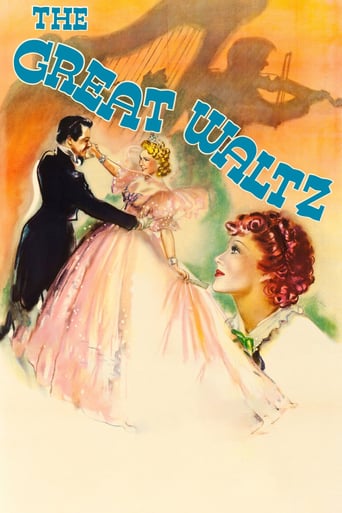jakob13
The New York Times has spoken long of Julien Duvivier. Does he deserve a retrospective? Yes, he indeed does. A good place for the English speaking world to begin is the 1938 'Great Waltz', with a grand cast of mainly European actors: Luise Reiner, Fernand Gravet, Miliza Korjus, Herman Bing, Sig Ruman, and the usual American character actors like Hugh Herbert and Leonid Kinsky and the British Lionel Atwill, who once played the lead opposite Marlene Dietrich in von Sternberg's 'The Devil is a Woman'. Is it too much to say in this sentimental, romanticized Hollywood rewriting of Strauss' life, with music and song and dancing and period costumes that it had something that we find in the UFA films Nazi Germany churned out with the likes of Zarah Leander. Grand fluff to distract the masses from the Great Depression and daily hardship and the gathering of war clouds in Asia and Europe. The year 1938 and the idealization of Vienna is an anachronism, for it was that very year that Hitler's troops annexed Austria to Germany. And the pogrom against Jews and leftists and anti Nazis began with the outcome we tragically came to know. It was Luise Reiner's first film, and she won the Oscar for best actress, which she well deserves as Poldi Strauss' wife. The contralto Korjus added great glamour and the argent clarity of her voice as the other woman. Gravat infused his Strauss with the fantasy of the musical genius he was, as the film had his inspiration say for Tales of the Vienna Woods and Blue Danube come into his mind as though they were generated spontaneously. And then Hollywood enlisted the lyrics of Oscar Hammerstein II to make sure our toes were tapping to the rhythm of the waltz...making everything so Gemutlich and coating the story with more sugar than necessary. Almost 78 years later, it's a grand, but silly film to watch.
jjnxn-1
Beautiful music interwoven throughout a standard script. The Vienesse Teardrop does well enough in her stock role of the long suffering put upon wife and as always she cries beautifully but Fernand Gravey is flat in the lead. The kind of picture where Strauss can compose Tales from the Vienna Woods just by taking a carriage ride through them with Miliza Korjus happily trilling away and suddenly without any struggle whatsoever have the whole thing ready for a performance at the end of said ride! A great deal of Strauss' music is here so that is a tremendous inducement but there is also quite a bit of operatic singing, if that's your cup of tea great, all others beware.
wes-connors
In 19th century Vienna, bank clerk Fernand Gravey (as Johann Strauss II) gives up his career to write waltzes. He is supported by fluttery Luise Rainer (as Poldi Vogelhuber), but becomes infatuated with flirty Miliza Korjus (as Carla Donner). Joseph Ruttenberg won an "Oscar" for the cinematography. "Academy Award" members gave Ms. Korjus a "Supporting Actress" nomination for her glass-shattering role. A back-to-back "Best Actress" winner for supporting performances in "The Great Ziegfeld" (1936) and "The Good Earth" (1937), top-billed Ms. Rainer did not receive her annual award for this one. The bloom was off the rose. MGM and Rainer parted company after one more film. This excruciating production features some good music... well, it is Strauss.**** The Great Waltz (11/4/38) Julien Duvivier ~ Fernand Gravey, Luise Rainer, Miliza Korjus, Hugh Herbert
edwagreen
Am one of the few critics who was disappointed by 1938's "The Great Waltz." While it is true that the music is wonderful, it also must be noted that the first part of the film is rather dull.Luise Rainer came into this film after back to back Oscar wins in 1936 and 1937. At the beginning of the film, her behavior is rather churlish. That laughter that she displays is outright annoying. It is only when she is married to Strauss that she shows maturity and her performance becomes better.Miliza Korjus, a wonderful opera singer, sings beautifully here but when she speaks, I thought I was viewing a comedy. Ms. Korjus reminded me of a Bette Midler talking like the late comedienne Martha Raye or as Katina Paxinou did in "Mourning Becomes Electra" in 1947.The picture takes place during the backdrop of the various revolutions circa 1848. As far as this film was concerned, I never saw a revolution go by so quickly.The film basically deals with the romance between Strauss (an appealing Fernand Gravet) and Carla Donner (Ms. Korjus- who acts more like a Prima Dona here).It is ironic that the film did little to enhance the careers of Gravet, Rainer and Korjus. Korjus never made another American film despite her Oscar nomination as best supporting actress. After a series of flops, Rainer was washed up in films by 1942 and who ever heard of Gravet again?




